ANGELA WASHKO: POKING THE HIVE
/ANGELA WASHKO: POKING THE HIVE
Gillespie Gallery
August 27 - October 5, 2018
Angela Washko: Poking the Hive is an exhibition of the artist’s video works and video gaming interventions. Washko’s work attempts to disclose the cultural stereotypes of women embedded within video game narratives and characters, the ways in which anti-feminist attitudes manifest in the interactions of online gaming communities, and how a purposeful redirection of game play can often elucidate the cultural constructs that inform it.
The exhibition features videos from four major bodies of work by the artist including The Council on Gender Sensitivity and Behavioral Awareness in the World of Warcraft (founded 2012), The World of Warcraft Psychogeographical Association (founded 2012), Free Will Mode (2013-2017), and Heroines with Baggage (2011 -2014).
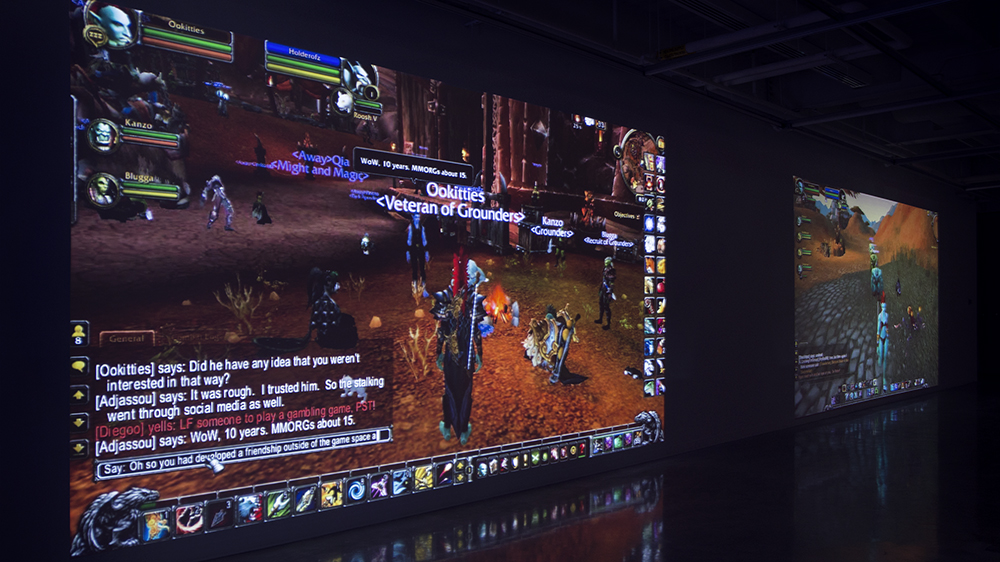
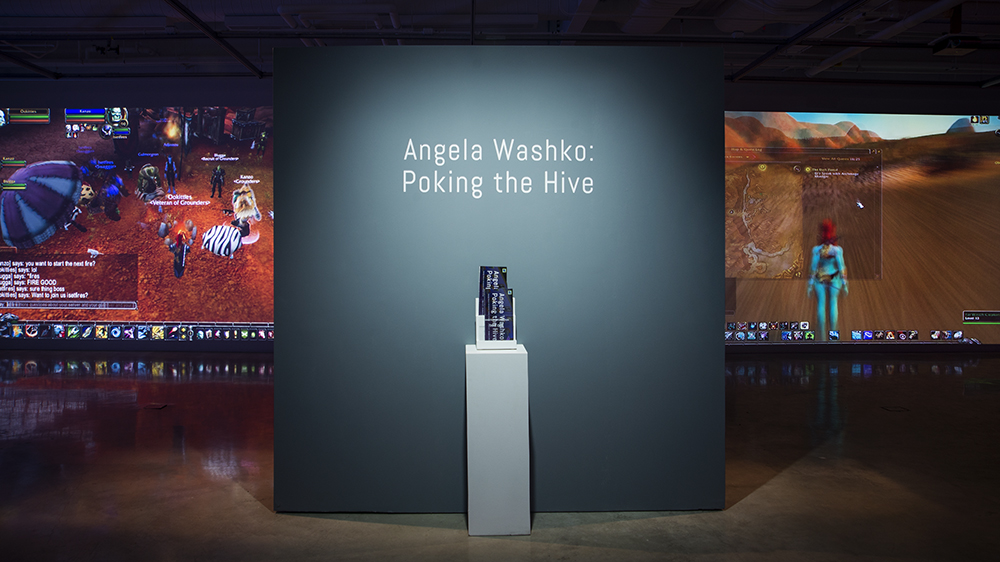
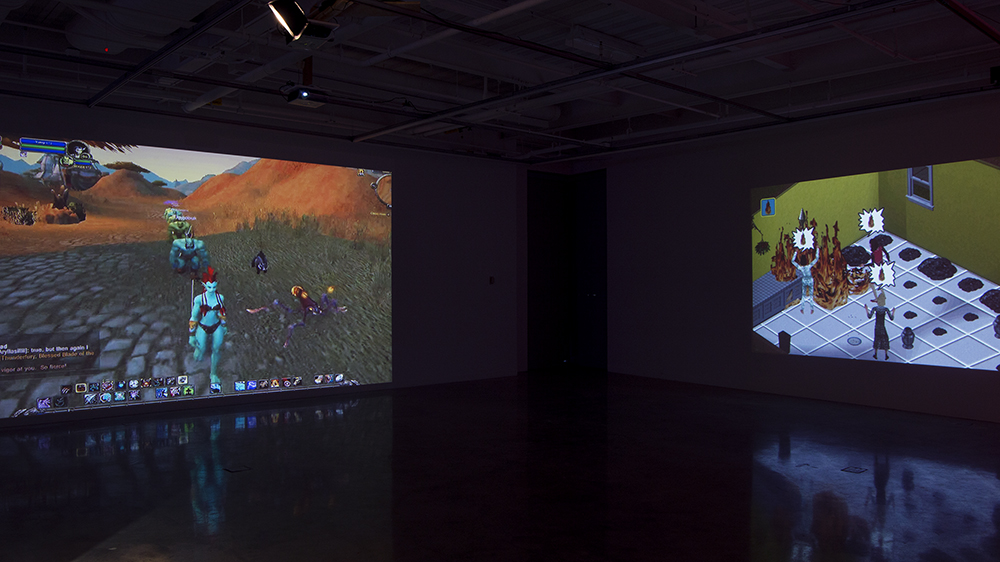
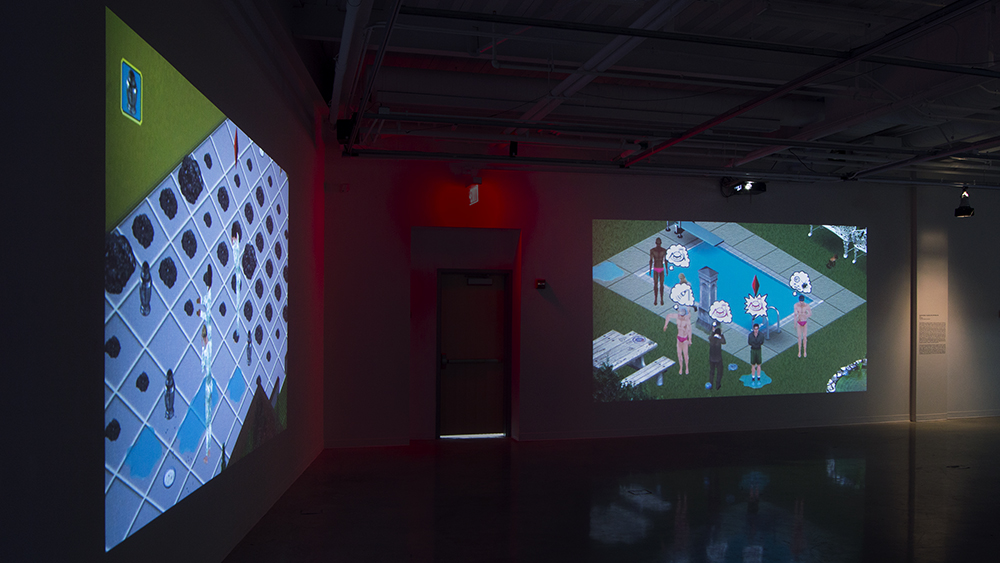
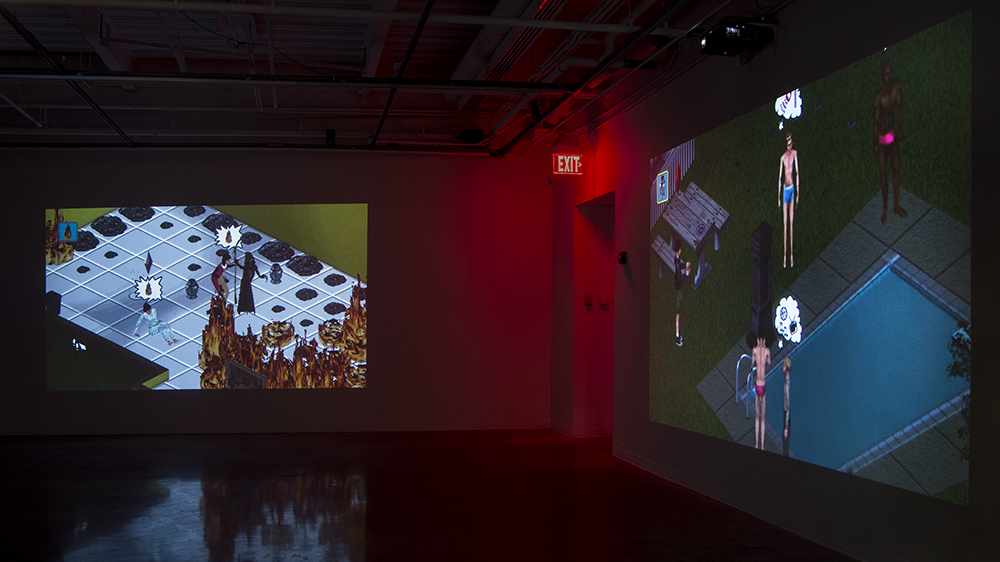
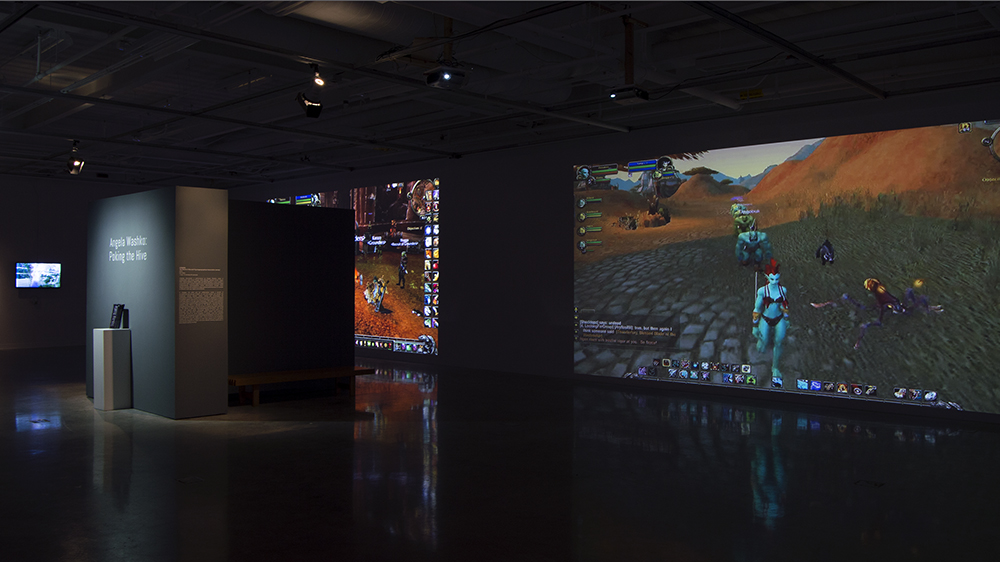
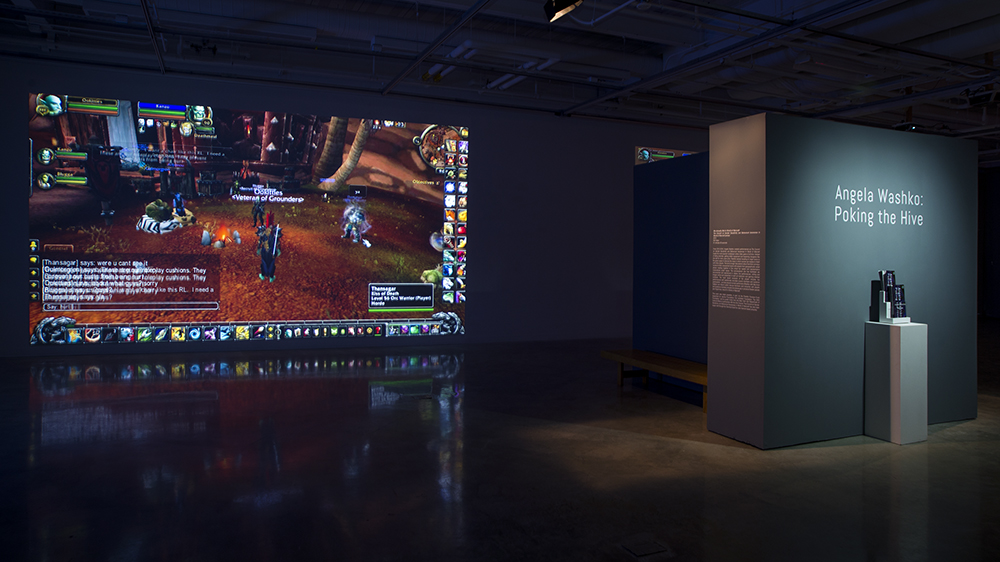
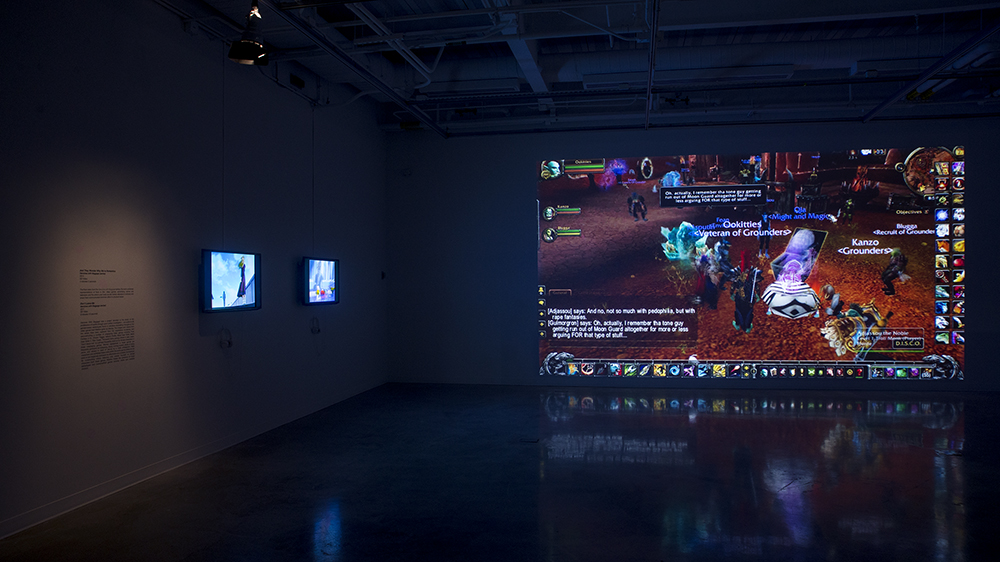
Heroines with Baggage
In Don’t Leave Me and And They Wonder Why We’re Romantics from the video series, Heroines with Baggage, Washko explores the proliferation of gender-based stereotypes within the storylines of the role playing games that the artist played throughout her adolescence in the 1990s and early 2000s. To make the videos she edited together sequences from the games that include not-so-subtle anti-feminist plot points and characterizations in which female characters are usually portrayed as submissive, weak, or needing care and commonly seen collapsing from exhaustion or emotion, expressing fears of being alone, running scared, passively dying, or finding themselves in some other form of peril or sentimental anguish. Washko argues that representations such as those seen in these games help reinforce negative gender-based stereotypes and binaries.
Performing in World of Warcraft
The role-playing game World of Warcraft (WoW) is the most popular and highest-grossing multiplayer online role-playing video game (aka MMoRPG) of all time. Much of WoW gameplay involves players developing the skill base and experience points of their fantasy avatars, which can range from orcs and elves to warrior pandas, and completing a variety of challenging quests individually or in groups. The game’s collaborative features also create a chatroom like forum for all kinds of conversation and opinions regarding the game, fellow players and the broader culture. As a long time gamer and through many years of participating in World of Warcraft, Washko noticed that the conversations happening in many parts of this massive networked public social space had also become aggressively misogynistic, racist, and homophobic and many players were expressing increasingly hostile views. As a creative reaction to this environment, Washko began to develop a series of performative interventions that could interrogate and respond to the oppressive behavior, sexism, and anti-feminist values expressed in this virtual social space.
To structure these creative interventions Washko developed the performative stage title The Council on Gender Sensitivity and Behavioral Awareness in World of Warcraft. Informed by her own exclusionary experiences in the game, Washko’s informally organized council became a real forum to facilitate public conversations about the experiences of women inside major towns in the game space. This led to longer discussions about feminism, as well as a myriad of other unexpected topics, with players from geographically varied places meeting together in this virtual but spatial and representative corporatized public space. Along the way the conversations were documented and reproduced in videos, live performances, writing and images and presented in both art institutions and gaming oriented contexts. We Actually Met in World of Warcraft, presented here is a recording of one such live performance.
Alongside the interventionist performances as The Council on Gender Sensitivity and Behavioral Awareness in World of Warcraft, Washko was also creating a body of performances that would respond to the designed elements of the game environment created by the developers of WoW. For these performances Washko operated as The World of Warcraft Psychogeographical Association, in which the artist pursued a festive remapping of the game environment through various creative strategies such as: actively following another player’s path through the game world, encouraging players to share information and converse about parts of the landscape they found most interesting, getting off the grid and exploring the margins of WoW’s vast continents, dancing with animal AI encountered in the wilds of WoW, avoiding engaging in combat when combat is expected, jumping from beautiful waterfalls for the visuals alone, dying repeatedly by ignoring designed limitations, or flying with other players to the moon. By taking on the strategies used by psychogeographers and applying them to the virtual environment, Washko is able to rethink the utilitarian elements of the WoW landscape and find new ways of playing within it - free from the rigid quest structures the developers encoded onto it.
Free Will Mode
Free Will Mode, the final series represented in the exhibition, is an exploration of the ideologies embedded in the wildly popular late-90’s human simulation game, The Sims. In The Sims players build homes for artificially intelligent humans they can direct, making sure that they are fed, entertained, clean and well-rested as they go about their daily lives. When players click a box labeled “Free Will Mode,” the AI eat when hungry, urinate when necessary, sleep when tired, socialize when bored...but never alter the environment they’ve inherited, even if it kills them. The artist builds unusual architectural environments for these simulated humans, which test the constraints of their ability to rethink the environments they’ve been placed in. Washko acts as a sort of digital saboteur, throwing a figurative wrench into the innerworks of the game and seeing what anarchy ensues as the AI logic becomes undone.
Looking at these works as a cultural critique, the resulting chaos represented in the videos not only humorously subverts the game designers’ cynical system of self-improvement and banal domesticity but also exposes a fragility in the arbitrary cultural biases and heteronormative assumptions that govern many of the societal expectations upon which the original Sims franchise is based.
About the Artist
Angela Washko is an artist, writer and facilitator devoted to creating new forums for discussions of feminism in spaces frequently hostile toward it. She is a recent recipient of a Franklin Furnace Performance Fund Grant, a Frank-Ratchye Fund for Art at the Frontier Grant from the STUDIO for Creative Inquiry, and a Rhizome Internet Art Microgrant, Washko's practice has been highlighted in Art in America, Frieze Magazine, Time Magazine, The Guardian, ArtForum, ARTnews, The Hairpin, VICE, Hyperallergic, Rhizome, the New York Times, Neural Magazine and more. Her projects have been presented nationally and internationally at venues including The Museum of the Moving Image (New York), Kiasma Museum of Contemporary Art (Helsinki), Los Angeles Museum of Contemporary Art, the Milan Design Triennale, the Shenzhen Independent Animation Biennial and the Rotterdam International Film Festival. Her writing has been published in Creative Time Reports, FIELD Journal of Socially Engaged Art Criticism, Copenhagen University Peer Reviewed Journal (NTIK), Neural Magazine, VASA Journal of Images and Culture, .dpi Feminist Magazine of Art and Digital Culture, ANIMAL NY and more. She is currently Assistant Professor of Art and Carnegie Mellon University.
Exhibition Curator: Jeffrey Kenney


